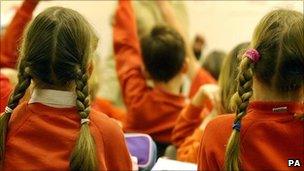Most pupils in schools which will face cuts, claims IFS
- Published

Head teachers' leaders say it will be some months before the full effects of the review are known
Most pupils are in schools which will have their funding cut, despite the announcement of an increase in the schools budget, a think tank says.
England's schools spending is to rise by 0.1% a year, including the new pupil premium for disadvantaged pupils.
But the Institute for Fiscal Studies says 87% of secondary pupils and 60% of primary pupils are in schools where funding will fall.
The government questions the research but admits the settlement is "tough".
Education Secretary Michael Gove said on Wednesday that some schools would have to make savings.
His department fared better than most in the Spending Review.
Funding frozen
The IFS based its calculations on the assumption that the government would give an estimated ÂĢ2,400 to schools for each pupil on free school meals under the new pupil premium scheme, on top of the funding the government already gives per pupil - which has been frozen in cash terms.
The pupil premium scheme is aimed at closing the achievement gap between rich and poor students by giving schools extra money for the disadvantaged children they have.
The IFS calculated that most pupils were in schools which would face cuts and that 43% of pupils in less deprived schools would see cuts of 5% or more.
Meanwhile, one in eight pupils in very deprived schools would see a funding increase of 5% or more.
Luke Sibieta, of the IFS, said: "Some very deprived schools will see an increase, but there will be more schools that lose than gain.
"By and large the average cut will be 2.25%."
He said the settlement was progressive - harder on the most advantaged: "Everyone is receiving cuts but the cuts are generally smaller in the most deprived schools."
The IFS also found that despite the increase in overall school spending (0.1% per year in real terms), school spending per pupil would fall in real terms by 0.6% per year - to a total of 2.25% over four years.
The researchers based their calculations on an estimate that pupil numbers would rise by an average of 0.7% per year.
'Strongest protection'
The government says it has never claimed that spending per pupil will rise - only that overall schools spending will.
A spokesman for the Department for Education said the IFS had based its research on assumptions about how the pupil premium would work - and decisions had not yet been taken on this.
"We've only just finished consulting and will set out in due course how we target the most disadvantaged pupils and how it is being phased in up to 2014," he said.
"The fact is the overall schools budget is going up in real terms including a ÂĢ2.5bn pupil premium. But this is a tough settlement and schools will have to make savings. The reform programme combined with a pay freeze will provide the workforce with the strongest protection possible."
On the day of the Spending Review, Michael Gove told ģÉČËŋėĘÖ Radio 4's Today programme the impact of budget changes would differ across the country and there would be some schools where "efficiencies will be demanded".
And he told ģÉČËŋėĘÖ London: "We can't predict what the effect overall of the education settlement will be. I'm sure that in some schools there will be a need for decisions to be takenâĶ meaning that there are certain posts which aren't filled in the future."
- Published20 October 2010
- Published18 October 2010
- Published16 October 2010